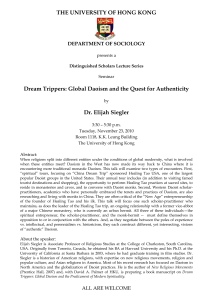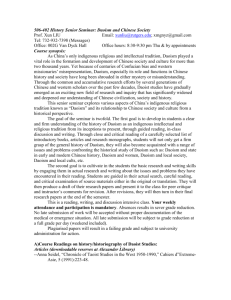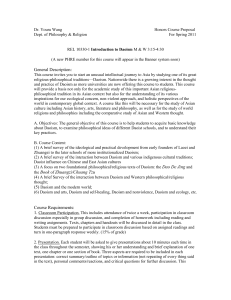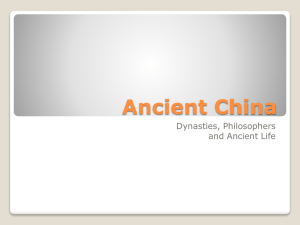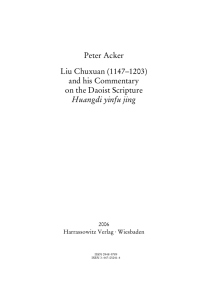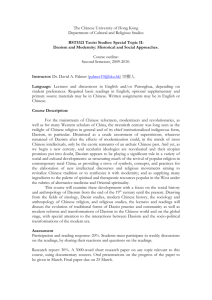Syllabus-Daoism - The Beijing Center for Chinese Studies
advertisement
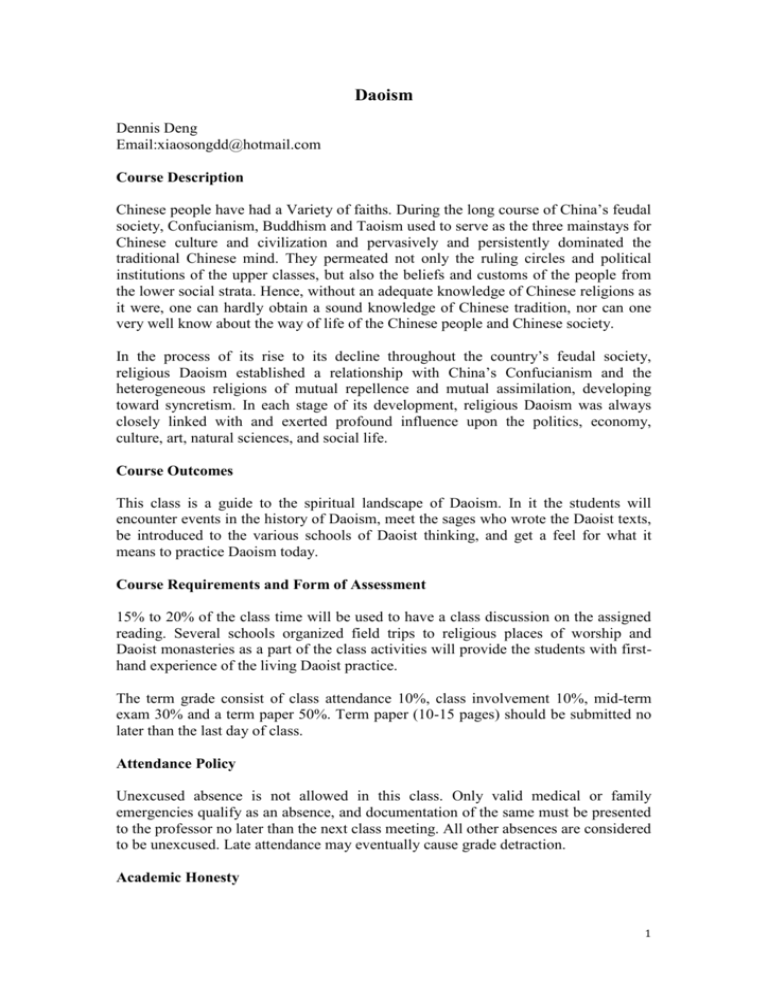
Daoism Dennis Deng Email:xiaosongdd@hotmail.com Course Description Chinese people have had a Variety of faiths. During the long course of China’s feudal society, Confucianism, Buddhism and Taoism used to serve as the three mainstays for Chinese culture and civilization and pervasively and persistently dominated the traditional Chinese mind. They permeated not only the ruling circles and political institutions of the upper classes, but also the beliefs and customs of the people from the lower social strata. Hence, without an adequate knowledge of Chinese religions as it were, one can hardly obtain a sound knowledge of Chinese tradition, nor can one very well know about the way of life of the Chinese people and Chinese society. In the process of its rise to its decline throughout the country’s feudal society, religious Daoism established a relationship with China’s Confucianism and the heterogeneous religions of mutual repellence and mutual assimilation, developing toward syncretism. In each stage of its development, religious Daoism was always closely linked with and exerted profound influence upon the politics, economy, culture, art, natural sciences, and social life. Course Outcomes This class is a guide to the spiritual landscape of Daoism. In it the students will encounter events in the history of Daoism, meet the sages who wrote the Daoist texts, be introduced to the various schools of Daoist thinking, and get a feel for what it means to practice Daoism today. Course Requirements and Form of Assessment 15% to 20% of the class time will be used to have a class discussion on the assigned reading. Several schools organized field trips to religious places of worship and Daoist monasteries as a part of the class activities will provide the students with firsthand experience of the living Daoist practice. The term grade consist of class attendance 10%, class involvement 10%, mid-term exam 30% and a term paper 50%. Term paper (10-15 pages) should be submitted no later than the last day of class. Attendance Policy Unexcused absence is not allowed in this class. Only valid medical or family emergencies qualify as an absence, and documentation of the same must be presented to the professor no later than the next class meeting. All other absences are considered to be unexcused. Late attendance may eventually cause grade detraction. Academic Honesty 1 Please refer to the following web link for policies on academic honesty: http://www.luc.edu/academics/catalog/undergrad/reg_academicintegrity.shtml Required Texts Wilhelm, Richard. 1962. The Secret of the Golden Flower. New York: A Harvest Book. Chan, Wing-tist. The Way of Lao Tzu, Translated, with introductory essays, comments, and notes by, WING-TSIT CHAN, paperback, New York, St. John’s University Press, 1963. Fung Yu-lan. Chuang-Tzu, A new Selected Translation, Shanghai, Commercial Press, 1933. (available in SACRED TEXTS OF THE WORLD a universal anthology) Fung Yu-lan. A Short History of Chinese Philosophy, New York, The Free Press, 1997. Reserved Readings Wong, Eva. 1997. Taoism - A complete introduction to the history, philosophy, and practice of an ancient Chinese spiritual tradition. Boston: Shambhala Publications. Robinet, Isabelle. 1997. Taoism-Growth of a Religion. Stanford: Stanford University Press. Kohn, Livia. 2003. Monastic Life in Medieval Daoism. Honolulu: University of Hawaii Press. Wong, Eva. 2000. The Health, Longevity, and Immortality, Boston: Shambhala Publications. All the above- mentioned readings are available in TBC library. Class Advancement Week 1 Introduction: Definitions and Controlling Concepts Taoism-Growth of a Religion P1-25 Week 2 The Warring States Taoism-The Dao TeJIng Chan, Wing-tist, The Way of Lao Tzu, a Translation and Study of the Tao-te Ching, paperback, New York, St. John’s University Press, 1962. Week 3 Zhuangzi Fung Yu-lan, Chuang-Tzu, A new Selected Translation, Shanghai, Commercial Press, 1933. Week 4 The Celestial Masters Taoism-Growth of a Religion P53-78 Kohn, Livia. 2003. Monastic Life in Medieval Daoism. Honolulu: University of 2 Hawai i Press. Wong, Eva. 2000. The Health, Longevity, and Immortality, Boston: Shambhala Publications. P70-115 Week 5 Gehong and His Tradition Taoism-Growth of a Religion P78-114 Kohn, Livia. 2003. Monastic Life in Medieval Daoism. Honolulu: University of Hawai i Press. Wong, Eva. 2000. The Health, Longevity, and Immortality, Boston: Shambhala Publications. P201-277 Week 6 The Shangqing and Lingbao School Taoism-Growth of a Religion P114-184 Week 7 The Tang Period Taoism-Growth of a Religion P184-212 Week 8 Under Song and the Yuan: Interior Alchemy Taoism-Growth of a Religion P212-257 Week 9 The Decline of The Taoist Religion and the Rise of Secret Societies during thePeriod of the Ming and Qing Dynasties Week 10 Seven Taoist Masters Wong, Eva. 1997. Taoism - A complete introduction to the history, philosophy, and practice of an ancient Chinese spiritual tradition. Boston: Shambhala Publications. Robinet, Isabelle. 1997. Taoism-Growth of a Religion. Stanford: Stanford University Press. P5-98 Week 11 Taoist Monastic Life-Monastic Life in Medieval Daoism P87-140 Week 12 Systems of Taoism Taoism-A complete introduction P99-195 Week 13 Taoist Practices-The Secret of Golden Flower 3
